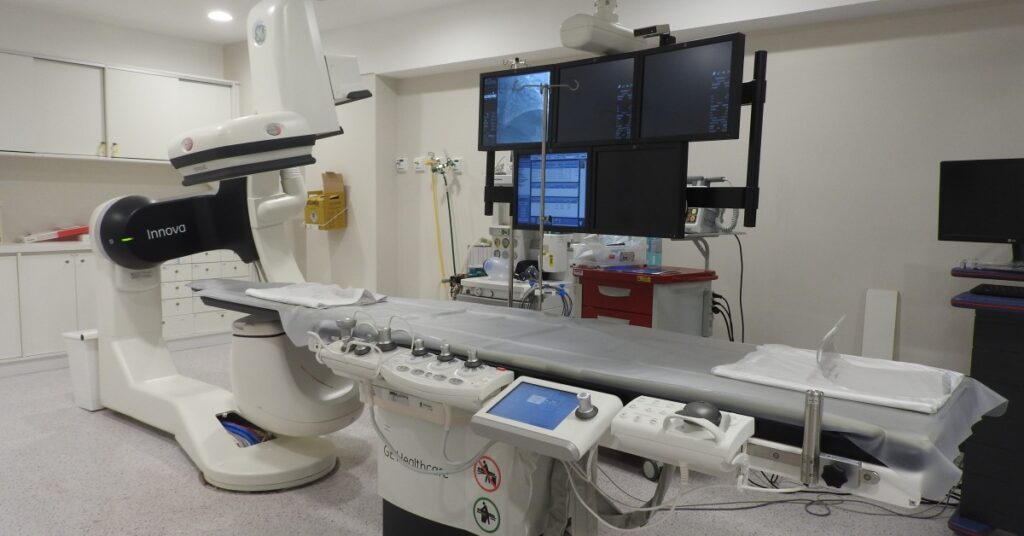
Does It Actually Matter Where I Get My MBA?
An MBA delivers a significant return on investment, not just [...]

Healthcare delivery is a complex enterprise. It involves not only the diagnosis and treatment of innumerable ailments but also an equally sophisticated business involving patient management, personnel management, billing, and regulatory compliance. We understand the intricacies of medical care, but we don’t often appreciate the challenges associated with the business side of things.
When people dream of healthcare careers, they usually dream of becoming nurses, doctors, or surgeons. It doesn’t occur to them that there are all kinds of jobs in healthcare that contribute to patient outcomes but don’t involve treating patients. Healthcare administration is an umbrella term for all the behind-the-scenes work that keeps hospitals, doctors’ offices, specialist clinics, and other medical facilities up and running. It encompasses staffing, finance, medical records management, operations management, and more.
There are many roles one can pursue in healthcare administration, from hospital executive to health information manager. Healthcare administration jobs are typically leadership positions in settings like medical facilities and nursing homes. However, there are also professionals working in healthcare administration roles in research laboratories, insurance companies, and government agencies.
It’s a broad discipline and one that’s relatively recession-proof. People don’t stop aging or getting sick or injured just because of an economic downturn. Jobs in health administration are currently being created much faster than in other fields. There’s nothing to indicate that will change any time soon, making this a good time to look into healthcare administration as a career.
In this article, we answer the question What is healthcare administration? and cover the following:
Before the late 1800s, doctors usually worked independently; the nurses who worked at hospitals and clinics weren’t able to do much more than offer comfort support to the sick or dying. Operational costs were relatively low because doctors often volunteered their time, and the expensive modern medicines and treatments we have today didn’t yet exist. Many hospitals were actually run as charitable institutions.
In 1880, sterilization techniques and the invention of rubber gloves made medicine safer. Subsequent innovations in anesthesia, antibiotics, and other treatments boosted patient outcomes. As medicine evolved and hospitals and medical facilities gained the ability to treat and even cure patients, these facilities also began to employ more staff and spend more money.
The first healthcare administrators were typically nurses and doctors, known as patient directors or hospital superintendents. Around 1920, medical professionals realized that practitioners couldn’t shoulder hospitals’ and clinics’ growing administrative needs. In 1934, the University of Chicago created the first two-year health systems management program. Since then, many other colleges and universities have created bachelor’s degree and master’s degree programs in healthcare administration.
| University and Program Name | Learn More |
|
Boston College:
Online Master of Healthcare Administration
|
The responsibilities of healthcare administration professionals differ from facility to facility. In a large hospital system, a healthcare administrator may oversee a specific department. In contrast, a healthcare administrator who works for a small private medical practice might handle the entire facility’s administrative needs.
Professionals who work in health administration may handle any or all of the following tasks:
At first glance, healthcare administration and healthcare management appear synonymous. Indeed, the Commission on Accreditation of Healthcare Management Education (CAHME), the accrediting organization for graduate healthcare management degrees in the United States, views health administration and healthcare management degrees as identical, using the terms interchangeably on its website and in its materials. So, what is the difference between healthcare administration and healthcare management? The answer depends on whom you ask.
Some degree programs draw a hard line between health administration and healthcare management, with the former focused almost entirely on staffing and staff supervision, and the latter focused on operations and facilities management. At some healthcare facilities, managers are concerned with big picture needs while administrators are concerned with day-to-day operations.
However, the dividing line between healthcare administration and healthcare management just isn’t as clear cut at most schools and workplaces. According to the program guide for the highly ranked online Master of Healthcare Administration (MHA) program at New York University‘s Robert F. Wagner Graduate School of Public Service, the curriculum covers the following:
Meanwhile, the curriculum in University of Rhode Island‘s Master of Science in Healthcare Management program includes courses like:
It would be difficult to tease out differences between healthcare administration and healthcare management based on these very similar curricula.
Once someone has a degree in healthcare administration or healthcare management, they usually qualify for jobs in both. A quick review of job postings for health administrators and medical managers reveals that most employers look for applicants with a “related bachelor’s degree” or a “related master’s degree.” That might mean a degree in healthcare administration like a Master of Health Administration, a degree in healthcare management, a Master of Health Services Administration, or even a Master of Business Administration in health administration.
A bachelor’s degree in health administration is the entry-level academic requirement to launch a healthcare administration career. However, more often people join the ranks of healthcare administrators after earning an MHA or one of the other graduate-level healthcare administration degrees mentioned above.
Many schools offer degrees related to health services administration, but some of the best programs at both the bachelor’s degree and master’s degree level can be found at the following colleges and universities:
Recent graduates of health administration bachelor’s degree programs sometimes start out in admissions, marketing, risk management, managed-care analysis, or other non-clinical staff positions and work their way into higher-level administrative roles. That said, while it’s technically possible to work in healthcare administration without an MHA, it can take a lot longer to climb the managerial ladder without a master’s degree.
That said, earning a master’s degree in health services administration can take upwards of two years and cost anywhere from $25,000 to $75,000—which means that sometimes going back to school simply isn’t in the cards. If you want to advance in a healthcare administration career without getting an MHA, the best entry-level positions for you might be:
Healthcare administration specializations exist at both the degree level and in health management careers. Different degree programs offer different concentration tracks to health administration students. Some common specializations include:
Some healthcare administration professionals choose to build their careers around specializations like:
Healthcare administration is a broad discipline with a variety of ways to customize a career in health administration.
According to the US Bureau of Labor Statistics, average wages in healthcare administration roles hover around $101,000. Health administrators who work for government agencies tend to earn the most while those employed by nursing homes and residential care facilities earn the least—but don’t let that fool you. Healthcare administration professionals who work in long-term care still earn about $87,000, and the highest-paid 10 percent of administrators in healthcare systems earn more than $189,000. Some healthcare executives earn more than $600,000.
Of course, numerous factors go into calculating average healthcare administration salaries. Healthcare administrators and healthcare managers tend to earn more in major metro areas like New York City and in states where the cost of living is high, like Massachusetts. The number of hospitals and the size of the elderly population in a given location may also play a role. And of course, there’s experience. Health administrators with a proven record of improving patient outcomes while also reducing a facility’s expenses almost always command a higher salary.
It’s not prestige that attracts people to this field. Healthcare administration has been described as the hidden healthcare profession because of its low profile in the medical world. Many people aren’t even aware of degree programs and certifications for health administrators and healthcare managers distinct from those for business management and HR professionals.
The high level of job security found in this field is a significant lure. People aren’t getting healthier, but they’re living longer because new medical technologies make it possible to treat or cure more ailments. The need for competent, qualified managerial healthcare professionals can only grow as the healthcare industry expands, creating opportunities in plenty of areas. Consider all the specialty areas listed above—clearly, healthcare administration is about more than just HR and balancing the books. Some health services administration professionals play a substantial role in promoting higher quality care in medical settings.
Finally, some people decide to launch careers in healthcare administration because they love medicine and want to be a part of the world of patient care, but they don’t want to go to medical school. After all, the medical field couldn’t have the positive impact on people’s lives that it does without people making smart decisions behind the scenes. As a healthcare administrator, you could be one of those people.
Questions or feedback? Email editor@noodle.com

An MBA delivers a significant return on investment, not just [...]

In the occupational therapy field, a doctorate can open doors [...]

Genetic counseling is a career that combines science and sensitivity,especially [...]

An MBA with a Healthcare Management concentration can equip you [...]

A Chief Information Security Officer is a relatively new designation, [...]
Categorized as: Healthcare Administration, Nursing & Healthcare